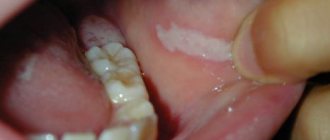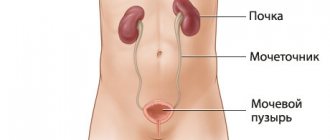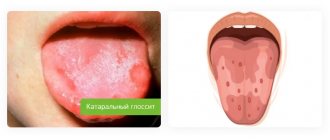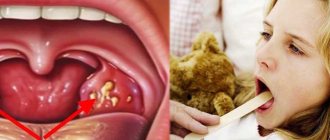A folded tongue is a congenital pathology characterized by abnormalities in the shape and size of the tongue. In approximately half of the cases, this pathology manifests itself together with desquamative glossitis. The folded tongue is also called “scrotal”. This pathology is one of the most common symptoms of Melkersson-Rosenthal syndrome.
Folded tongue: photos and symptoms
Usually the anomaly is detected in early childhood, but it also occurs in adults, since sometimes this problem does not bother the patient in any way, and the person is not even aware of its presence. The signs of the disease are as follows:
- Macroglossia, or enlargement of the tongue, which can affect a person's speech and chewing function. Usually the patient keeps his teeth in an open position.
- Folds and grooves appear on the surface, which are covered with papillae.
- The tongue is significantly thickened.
- The back and tip of the tongue are smoothed, the filiform papillae have atrophied.
- Increased sensitivity (especially in people who have undergone infectious diseases and surgical operations).
- Regular tingling and pinching sensation.
- Lymph nodes are enlarged.
- Smell from the mouth.
The folds, in turn, are different: transverse, deep longitudinal (and not very deep), fringed. Usually the main longitudinal fold (it is the largest and deepest) runs from the tip along its midline. The remaining folds lead exactly to it.
Sometimes this pathology accompanies desquamative glossitis (geographic tongue) - this is inflammation, as a result of which some areas of the organ become several shades lighter or acquire a gray tint. In general, the picture of the organ resembles a map, which is why it got its name.
Hairy black tongue (villous glossitis)
This form of glossitis is characterized by the growth and keratinization of filiform papillae (they become hair-like). The mechanism of development of this disease is not fully understood. According to one version, the development of villous glossitis is facilitated by the influence of local irritating factors, as well as candidiasis that develops while taking antibiotics.
Treatment of this form of glossitis includes mechanical (tweezers) removal of filiform papillae and subsequent treatment of the surface of the tongue with a solution of copper sulfate. For candidiasis, antifungal agents are prescribed.
Our team of doctors
Maxillofacial surgeon, Implantologist
Bocharov Maxim Viktorovich
Experience: 11 years
Dental surgeon, Implantologist
Chernov Dmitry Anatolievich
Experience: 29 years
Orthopedist, Neuromuscular dentist
Stepanov Andrey Vasilievich
Experience: 22 years
Endodontist, Therapist
Skalet Yana Alexandrovna
Experience: 22 years
Orthopedic dentist
Tsoi Sergey Konstantinovich
Experience: 19 years
Dentist-orthodontist
Enikeeva Anna Stanislavovna
Experience: 3 years
Symptoms of glossitis
The first thing those suffering from glossitis encounter is pain, burning, and severe discomfort in the oral cavity. Over time, the intensity of these manifestations increases, making it difficult to eat food. Taste sensations are dulled and may be completely absent. Some patients develop a perverted taste. The tongue begins to swell, which causes severe discomfort. The patient's speech is impaired, any movements of the tongue bring pain. Hyperthermia and deterioration in general health are possible. Upon examination, you can reveal an enlargement of the tongue, a change in its color to a brighter one, up to crimson. Ulcers, blisters, spots, erosions, plaque, and lesions with altered epithelial structure may appear on the mucous membrane.
The most dangerous complication of glossitis is phlegmon. A focus of purulent inflammation is formed, which rapidly spreads to the chin and neck and destruction of soft tissues. Such patients require emergency medical care.
Possible causes of pathology
The exact causes of the anomaly are unknown. But there are a number of factors that can provoke the appearance of pathology:
- chronic diseases of the liver, stomach, duodenum;
- skin diseases;
- pathologies of the nervous system;
- pathologies of the endocrine system;
- bone marrow diseases;
- acute infections;
- violation of the mucous membrane of the tongue and its trophic function;
- lack of vitamins and essential microelements in the body;
- collagenosis;
- human reaction to vaccination;
- hormonal changes (pregnancy, menopause, lactation).
Oral diseases (glossitis)
Glossitis is an inflammatory disease of the oral cavity that causes changes in the surface of the tongue. The tongue turns red and swells; A white coating, a burning sensation, and growths appear. There are more than 10 types of glossitis and only three of them are characterized by the appearance of cracks on the surface of the tongue.
Folded glossitis.
A congenital anomaly that is determined immediately after birth. Characterized by the presence of cracks of varying depths. Normally, they do not cause discomfort.
Diamond-shaped glossitis.
The affected area is diamond-shaped and has cracks in the middle of the tongue. Most often appears with gastritis with low acidity.
Desquamative glossitis.
It is sometimes called “geographical” because the lesions resemble the outlines of continents. Damaged areas can “move” on the surface of the tongue, almost always causing pain, burning, and shallow cracks. The reason for the appearance of such glossitis is still not clear. Some argue that this is an allergic reaction, others that it is a hormonal imbalance and gastrointestinal diseases.
Treatment of folded (scrotal) tongue
The anomaly usually does not bother its owners, however, sometimes they complain about its appearance: cracks.
A folded (scrotal) tongue requires especially careful care. Because food residues may be trapped in the folds. Because of this, bad breath occurs, as well as accompanying unpleasant symptoms: burning and inflammation.
In addition, the grooves may bother people who have suffered acute infections or surgical interventions. The reasons in this case are also clear: the overall tissue reaction in the body decreases, and the sensitivity of the surface of the folded tongue increases significantly. Therefore, it reacts painfully to chemical irritants and drugs.
If the patient does not properly care for the diseased organ, then the inflammatory processes can drag on, and this is a very favorable place for the development of fungal infections.
The dentist treats this pathology. It is he who will select oral care.
Sometimes a folded tongue requires surgery. This happens in cases where the organ is too enlarged and interferes with the patient. The operation involves excision of part of it.
So, in general, drugs are used to eliminate related problems:
- Fungal and bacterial diseases: anti-inflammatory, antifungal drugs, immunocorrectors, antiseptic treatment.
- Candidiasis: clotrimazole cream, shading with aniline dyes, 10% sodium borate solution in glycerin.
- Painful sensations: antiseptic rinses, mouth baths with citral solution, application of medications with anesthesin.
Diagnostics
This diagnosis is made based on the overall clinical picture. It is important to take into account that this pathology is one of the symptoms of Melkersson-Rosenthal syndrome. This means that a folded tongue can be either a congenital or acquired pathology.
It is very important at the diagnostic stage to differentiate the pathology of the folded tongue and sclerosing glossitis, which is similar in manifestations. This change in the structure of the tongue occurs against the background of secondary syphilis. In this case, a similar structure of the tongue, resulting from an increase in the size of the connective tissue, is accompanied by compaction and decreased mobility. The folded tongue, on the contrary, is quite soft, although larger in size. There are no difficulties when chewing or speaking.
Features of care
If you have this pathology, you do not need to self-medicate; careful care and supervision by a specialist are required. In general, you should take care of your oral cavity as follows:
- general oral hygiene;
- rinsing;
- if the patient uses removable dentures, they should also be thoroughly cleaned after eating;
- it is necessary to avoid spicy, salty food, it should not be too hot or cold;
- giving up bad habits (smoking, alcohol);
- You need to brush your teeth with a special paste;
- the toothbrush should be made of synthetic materials: this will help avoid damage;
- regular visits to the dentist.
Such careful care will help neutralize the oral cavity from bacteria, which will prevent their proliferation and the occurrence of associated infections.
Author:
Treatment
A folded tongue can be a separate disease, or it can be a symptom of a serious chronic illness. Therefore, the treatment of this pathology may differ in different patients.
As a rule, if the folded tongue does not bother the patient in any way, then he is not given any specific treatment. Typically, such people are only advised to pay more attention to the hygienic care of their tongue, not allowing food debris to accumulate in the tongue folds.
However, if the disease becomes complicated and develops into glossitis, then treatment becomes necessary.
If the signs of scrotal inflammation of the tongue tissue are a manifestation of a general pathology in the body (for example, it is one of the symptoms of a disorder of the cardiovascular, endocrine, respiratory or digestive systems), then the underlying ailment must be treated.
Drug treatment
The following measures are usually used in the treatment of glossitis:
- root cause control and comprehensive examination;
- anti-inflammatory treatment using antibiotics;
- corticosteroids for rapid relief of acute inflammation;
- use of antimycotics (to fight fungal infections);
- immunity-boosting drugs;
- rinsing and irrigating the mouth with herbal decoctions;
- local and general anesthesia using tablets and gels;
- sanitation of the oral cavity.
If glossitis bothers the patient as an aesthetic defect, laser treatment is often effective. At the same time, the folds seem to evaporate and smooth out, and the tongue itself shrinks and becomes more even.
Surgery
Surgical treatment is not often used for scrotal glossitis. It involves surgically suturing the grooves of the tongue. After the surgical stage, restorative treatment using laser and medications is used.
The postoperative period after such suturing usually passes quickly. In this case, it is recommended to maintain “speech rest”, a minimum of chewing movements and gentle diet therapy.
After treatment for a folded tongue, it is important for the patient to reduce all risk factors as much as possible:
- eliminate alcohol and smoking;
- monitor oral hygiene;
- treat dental ailments in a timely manner;
- use high-quality fillings.
Folded tongue is not a serious illness, and the prognosis for patients is quite favorable. For such people, it is enough to be attentive to oral hygiene, paying special attention to cleaning the tongue. Symptoms that indicate an infection or other complications in the mouth should cause concern. Then it is unacceptable to refuse to contact specialists. Otherwise, the quality of life of people with this language anomaly is high enough to live long and joyfully.
Sources used:
- Rapini, Ronald P.; Bolognia, Jean L.; Jorizzo, Joseph L. Dermatology: 2-Volume Set. —St. Louis: Mosby, 2007.
- Rationale for the prevention of cancer of the oral mucosa, tongue, lip / Bulyakov R. T., Sh. Kh. Gantsev and O. A. Gulyaeva. — M.: LAP Lambert Academic Publishing
- Guide to practical dentistry: monograph. / L. Baum, R.V. Phillips, M.R. Lund. — M.: Medicine
- National Library of Medicine (USA)
What color is the pathological plaque?
By the color of the coating on the tongue, you can determine which organ malfunction caused it:
| White | A light whitish coating that can be easily cleaned with hygiene procedures is the norm for an adult. A cause for concern is if the white coating is dense or has a cheesy structure and is not cleaned. This may be a sign of a fungal infection. Other reasons include: monotonous diet, lack of vitamins, poor hygiene, smoking, intoxication, wearing dentures, taking medications. |
| Grey | Sometimes the tongue becomes covered with a gray coating when taking antibiotics for a long time. Also accompanies diseases of the gastrointestinal tract. |
| Yellow | Often indicates liver disease (in such cases a bitter taste is felt in the mouth). It can also occur with diseases of other organs of the digestive tract, with viral diseases, with an excess of bile in the body. |
| Green | This is a rare occurrence. Most often it is an indicator of liver problems. |
| Brown | Occurs with disorders of the digestive tract, alcoholism and smoking, and abuse of brown foods (chocolate, coffee, black tea). |
| Orange | It occurs mainly with gastritis, due to the fact that gastric juice enters the oral cavity in large quantities. |
| Blue | It may appear due to problems in the cardiovascular system, kidneys, due to a lack of folic acid, iron, Vit C, Vit B12. It can also appear due to mercury and heavy metal poisoning. |
| Black | Appears in cases of liver dysfunction, lead poisoning, acute infections, Crohn's disease, acidosis. |
What is dangerous, consequences
With proper care, the grooved tongue does not cause discomfort to the owner. Failure to comply with important points of care for a diseased organ and neglect of the disease can lead to the appearance of various infections, for example:
- Catarrh;
- Candidal glossitis;
- Phlegmon;
- Abscess;
- Hyperkeratosis.
There is also a risk of tongue cancer. Acromegaly may occur when both cheeks and tongue are folded. In case of inflammation, you need to brush your teeth very carefully so as not to touch the painful surface of the organ with the brush.
Geographic fold tongue
There is also a condition called geographic tongue (desquamative glossitis). It is characterized by the presence of reddish or gray spots on the surface. They are separated from each other by yellowish formations of thread-like nipples. Thanks to this, the organ resembles a geographical map. Often, scrotal tongue becomes one of the concomitant diseases.
Melkersson-Rosenthal syndrome
The disease presents with significant swelling of the lips and tongue, as well as facial nerve palsy. Folding is a symptom of the disease in half of the cases.
Folded tongue with white spots
White spots may be signs of concomitant pathologies. Among them:
- Desquamative glossitis;
- Melkersson-Rosenthal syndrome.
- Candidiasis glossitis.
Preventive techniques for glossitis
Most often, the disease is much easier to prevent than to treat.
For this reason, dentists advise following the following preventive techniques:
- following the rules of dental and oral hygiene;
- systematic preventive examination in the dental office;
- reducing the use of hot spices that irritate the mucous membrane of the tongue;
- giving up cigarettes and alcoholic beverages.
Timely and high-quality treatment can easily eliminate glossitis, while the complete absence of therapy leads to irreversible and sad consequences.
Types of folds on the tongue
Natural folds in the tongue are classified based on their location and direction. So, there are several types of grooves on the organ:
- fringed, which are located under the tongue,
- longitudinal,
- transverse.
The main longitudinal (vartical) fold extends from the tip to the midline of the tongue. It is the most noticeable and deep. On the lower surface of the organ there are so-called fringed folds - thus forming a system of grooves on the tongue.










